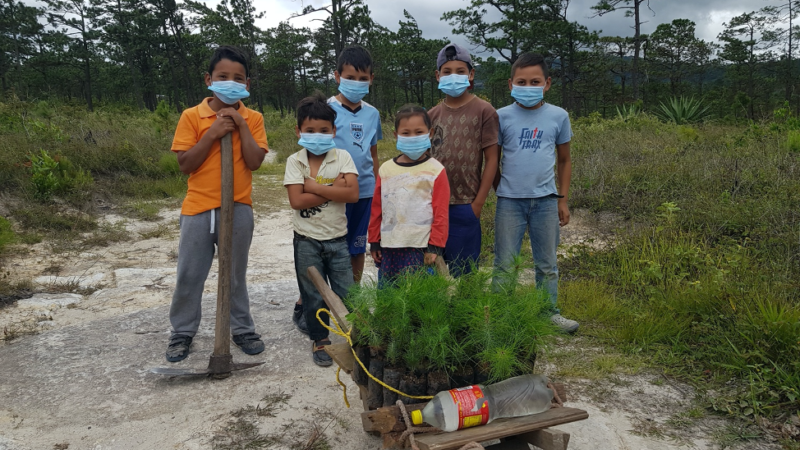Climate adaptation and resilience projects are continuing to help some of the most vulnerable communities on Earth, despite the impact of the coronavirus.
“We are facing one of the largest challenges in generations with the Covid-19 pandemic,” said Adaptation Fund manager Mikko Ollikainen.
“We see Adaptation Fund projects adapting directly to help with the crisis, and inherent adaptation measures in projects helping vulnerable communities build resilience to climate change, as well as broader resilience to environmental, health and economic challenges,” he added.
In Honduras, an Adaptation Fund (AF) project is building the resilience of natural ecosystems through reforestation and water resource management, as well as providing technical and administrative training to local municipalities.
According to the Climate Change Performance Index, published by non-profit organisation Germanwatch, Honduras was ranked second in a list of countries most affected by extreme weather from 1998 to 2017. The region also suffers from the effects of El Niño and La Niña.
The Central American country of just under 10 million people has also been badly hit by Covid-19, where there have been over 50,000 cases and 1,800 deaths.
But even in the face of the pandemic, the AF-funded project, “Ecosystem-Based Adaptation at Communities of the Central Forest Corridor in Tegucigalpa,” sustains climate resilience activities.
“Covid-19 put us on mobility restraints but forest and water management cannot be stopped – water [availability]and access are even more important when human health is at risk,” said Evelyn Rodriguez, climate change adaptation specialist in the project’s unit for UNDP.
“It was wonderful to see how the technical staff, implementing partners, researchers and beneficiaries adapted to continue working to ensure water provision and supply of ecosystems’ goods and services in the Central Forest Corridor communities.”
The work, implemented by the United Nations Development Programme (UNDP) and executed by the Ministry of Energy, Natural Resources, Environment and Mines, is taking place in the Central Forest Corridor that surrounds the country’s capital city.
It’s largely a multi-disciplinary and integrated approach; thousands of hectares of forest are being restored, agroecological water management practices for farming are being promoted, and community households have begun to receive tanks that capture and store rainwater for drinking.
To address challenges with Covid-19, the Lenca people, an indigenous group that lives in the Central Forest Corridor, decided with community leaders to go out household by household to plant thousands of pine trees.
They were organised so that small groups could spend every other day planting to minimise the risk of spreading Covid-19 – and it paid off. In 4 weeks, 8 families had managed to plant 6,000 trees in the Santa Ana municipality.
The project is also looking at how to combat forest fires, which are becoming more frequent as global temperature levels rise.
“We have seen the forest burn like never before. But our communities responded,” said Fernando Cruz, a forest keeper in La Tigra National Park.
“When Covid-19 hit us, we kept our effort to maintain our water resources. We went out to plant and restore our forests,” he added. “Covid-19 has caused an economic crisis but despite that we need to maintain unity, love and perseverance to preserve our water sources”.
Wilfredo Cerrato, president of local water association Ajarco, said the community has stepped up during quarantine. “They know that pandemic or not, forest fires have to be controlled and reforestation has to be done if we want our water supply.”
And the Honduras project is not alone in the way it’s adapted to the coronavirus.

A self-sustaining greenhouse as part of the Adaptation Fund project (Photo: UNDP Uzbekistan)
In Karakalpakstan, located in north-western Uzbekistan, another Adaptation Fund project implemented by UNDP has helped communities stay resilient during the pandemic by giving over 1,000 families in the region the resources to build their own self-sustaining greenhouses.
Locals are being trained in greenhouse methods of growing vegetables and fruits – this in turn has so far helped over 5,000 family members with income and food supplies while they have been quarantined at home.
And in Costa Rica, an AF project which promotes food security by empowering farmers to diversify production has, since the pandemic, put an emphasis on local production to support the local supply chain at a time when transport has been limited.
“At this time of Covid-19, the initiative is also a way for the sector to support and differentiate itself and work in local supply,” said Carolina Reyes, project manager at Fundecooperación para el Desarrollo Sostenible, the Fund’s direct access accredited national implementing entity in Costa Rica.
The project has also looked at ways of increasing water security: “by improving local aqueducts, communities have also been able to access water and improve the management of this resource. This is important in the case of the pandemic,” Reyes said.
Overall, in light of the coronavirus, the Fund’s projects have really given the term ‘adaptation’ a new meaning and proves the importance of preparing for crises through adaptation and resilience efforts.
“It is great to see the Fund continue to adapt and deliver to the most vulnerable, while furthering knowledge during the crisis,” said Ollikainen, adding, “it will be imperative to look at recovery in the context of both climate change resilience and other dimensions of sustainable development.”
This post was sponsored by the Adaptation Fund. See our editorial guidelines for what this means.
Listen to a related podcast on this theme.
